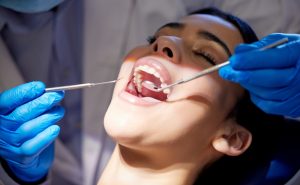Calcium deposits on teeth can be a nuisance at best, but they can lead to more complicated problems with your mouth later on if not treated properly or right away. That’s why having a regular oral hygiene routine is a great idea when keeping substances off of your teeth that you don’t want there.
Take a look at our guide to calcium deposits on your teeth so you know what to do to prevent them from building up.
What are calcium deposits?
Calcium deposits on your teeth occur when a filmy substance called plaque builds up over time, and plaque can harden into a substance called tartar or calculus.
Related Post: Parkcrest Dental Group Answers: What Is Plaque and How Does It Form?
How long does it take for calcium deposits to form on your teeth?
Plaque can form hard tartar in as little as 48 hours, which is why it’s important to brush and floss your teeth every day.
What do calcium deposits on your teeth look like?
Calcium deposits might look like a white, chalky substance on your teeth initially. When the calcium hardens into tartar, it may turn into stains that look tan, yellow, or even brown or black. Ordinary brushing cannot remove tartar from your teeth, and it requires your dentist to take a look at it and remove using a special instrument.
How does a dentist remove calcium deposits from your teeth?
Your dentist or dental hygienist may use a scaler and curette, two tools used to remove calcium deposits or tartar from your teeth. Because calcium deposits are harder than the film that forms on your teeth every day, ordinary brushing doesn’t remove it at all. A dentist or hygienist will use the scaler to gently scrape against your teeth to remove the discoloration.
Another tool your dental office might use is an ultrasonic scraper, an instrument that vibrates at a very high rate. It also shoots a gentle stream of water to remove the tartar from your mouth.
What can calcium deposits lead to?
Calcium deposits can cause some complications if left untreated over time. Tartar and plaque can cause bad breath. Bleeding gums can occur due to inflammation in your mouth as your body tries to naturally fight off the bacteria that collects.
Bleeding gums can lead to gum disease, also called gingivitis. Periodontitis or periodontal disease occurs when infections become more prominent, and this problem can lead to cavities, tooth loss, and weakened bone structure in your jaw.
Related Post: The Most Common Signs That You Have Gum Disease
What can make calcium deposits on your teeth worse?
Consuming a lot of sugary drinks or sugary foods without brushing your teeth can make calcium deposits and tartar worse because the bacteria in your mouth continue to feed off of the sugar. Smoking can also cause calcium deposits to accumulate faster.
Who can help me with calcium deposits and tartar buildup on my teeth?
The dentists and oral hygienists at Parkcrest Dental Group can help you by cleaning and polishing your teeth thoroughly with twice-yearly checkups. Feel free to reach out to us anytime during office hours by calling (417) 887-1120. We’re happy to assist!





